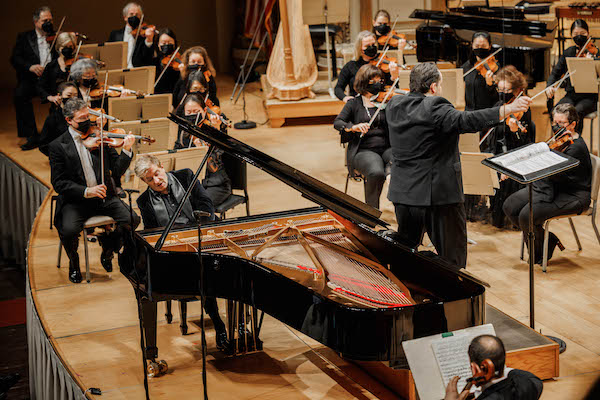Engaging Thomas premiere highlights Boston Symphony concert

Jean-Yves Thibaudet performed Liszt’s Piano Concerto No. 2 with Andris Nelsons and the BSO Thursday night. Photo: Aram Boghosian
Augusta Read Thomas has long been fascinated with the relationship between science and art. Works such as Orbital Beacons and Words of the Sea—two of her most arresting scores—explore cosmological as well as more earthbound themes. Each suggest that the arts can connect in deep and meaningful ways with the natural order of things.
Dance Foldings, her latest orchestral work, views a biological process as an aesthetic experience. Andris Nelsons led the Boston Symphony Orchestra in the work’s American premiere at Symphony Hall Thursday evening.
Commissioned by BBC Radio 3 and premiered at the Proms last August, Dance Foldings is a marvel of organic unity and unyielding energy. Much of that is owed to the work’s inspiration—the assemblage of proteins into strands of DNA in the human body.
Yet the score reflects the singular, lean-textured style Thomas has explored over her career. Melody, here, is wholly absent. Instead, repeated notes that originate in the piano, bassoons, and strings gradually evolve into complex patterns, conveying the spontaneity and unexpected diversions of natural phenomena over the work’s thirteen-minute span.
Varied instrumental coloring is just as essential. Long phrases in the upper strings move briskly one moment and freeze together in glistening harmonies in the next. Brass supply power and weight in a thorny chorale. All the while wood blocks, tom-toms, glockenspiel keep the energy moving forward.
Dance Foldings also bears the imprint of Stravinsky’s early ballets and big band jazz. Indeed, the work’s energy never ceases as the constant pulse frames every intricate rhythm. The effect, Thomas told the audience before the performance, was like watching images of a dance refracted through a prism.
Delightfully abstract and engaging, Dance Foldings stands as Thomas’s finest effort in recent years. Nelsons made a compelling case for the score, leading a performance marked by playful vitality.
On Thursday night, pianist Jean-Yves Thibaudet was the solo protagonist in Liszt’s Piano Concerto No. 2 Thibaudet stepped into these dates after Mitsuko Uchida was forced to cancel her appearances due to a back injury.
Thibaudet charted Liszt’s demanding score with boldness, flair and sensitivity. His gentle arpeggios teased the warmth and grace from the opening statements. Powerful chords, anchored by his sturdy left-hand, delivered greater urgency as the movement unfolded. The boisterous march of the third movement even took on impish humor.
Critics have long derided this concerto as vulgar. But its wild shifts in mood and style proved a treat in Thursday’s performance. Thibaudet’s whisper proved as powerful as his roar, and the second movement was rich in lyricism and chamber-like delicacy.
Nelsons coaxed tender solos from the ensemble. Blaise Déjardin’s cello line flowered into a melody taken over by woodwinds, while Thibaudet’s lines offered elegant accompaniment. The finale showcased the pianist in playing of elfin delicacy, his scales and arpeggios taking on palpable weight in the final bars.
After intermission, Nelsons led the orchestra in Beethoven’s Symphony No. 4.
On the surface, the Haydnesque Fourth Symphony is a lighter work than the revolutionary Third and seismic Fifth. But Nelsons views the score as a similarly dramatic statement, with tension building through each movement.
The conductor found the dark mystery of the opening Adagio, with the strings taking on a plush sonority. The movement proper, moving at a true vivace, crackled with precision.
Nelsons was in his element in the second movement, shaping the woodwind themes in long, arching phrases. Dotted figures in the strings also rose to the surface in all the right moments. The Scherzo lilted, and the final Allegro, taken quicker than the marked “non troppo,” made for a satisfying culmination.
The program will be repeated 1:30 p.m. Friday, 8 p.m. Saturday, and 3 p.m. Sunday at Symphony Hall. bso.org
Posted in Performances




